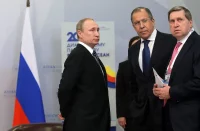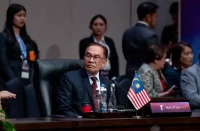January 1 is a new stage of development for the BRICS. This association is entering a new era. Fifteen years after its inception, the interstate is experiencing its first major expansion: Iran, Saudi Arabia, Egypt, Ethiopia, and the UAE have joined its ranks. The share of the new BRICS in global GDP at purchasing power parity will be 36% instead of 32% previously. Total GDP at purchasing power parity rises from $52.318 trillion to $58.919 trillion. At the same time, the total population of joined states will increase by 10% with the admission of new members, despite the fact that the most populous countries in the world, China and India, are already members of BRICS. The populations of Egypt and Ethiopia exceed 100 million each. This would bring the total population of the ten countries to about 3.6 billion — almost half of the world’s total.
If it used to be said that the center of the world, no matter what, political, economic or cultural, was in the West, it’s not now. There are tectonic shifts in both the global economy and global politics. The appeal of the BRICS is growing. Venezuelan President Nicolas Maduro, a politician of eccentricity, has also spoken out on the matter: “I hope that at the next summit in Russia Venezuela will join BRICS+ as a permanent member. Taking Argentina out of this giant BRICS is one of the stupidest things that Miley has done against Argentina. Because by pulling Argentina out of BRICS, he is acting against Argentinians.”
Indeed, the case of Argentina, which, two days before its accession, sent an official notice to member countries of its refusal, is unique in its own way. Such decision is a strange one indeed. Javier Miley, obviously as a protege of the U.S. State Department, has accomplished his task, but for how long? If this, so to speak, politician’s goal is to get out of the crisis, why is he not making the most of the opportunity? After all, leaving this union will significantly narrow the options for getting out of the current situation. This is what many experts are saying. Perhaps, he only listen to his “clone dogs”? If so, many things become clear. In any case, the poor Argentinians can be understood: years of economic failures have driven people to utter despair to vote for such a politician, and the United States has skillfully played on it.
Just 10 years ago, scholars were highly skeptical about the future of BRICS. They claim that the countries are dissimilar. The economies, cultures, and political structures are vastly different. The term “BRICS” itself was coined back in 2001 by analyst Jim O’Neill in a research for Goldman Sachs. Maybe no one could have predicted that this term would be given to an organization that, 20 years later, would surpass the Western world and begin to shape a completely new order.

In 2024, not only BRICS is replenished with new members, but also the chairmanship goes to the “rogue country” — Russia. At least that’s what most European media call it. But is it true? Where’s the common sense in that? How can the presidency of the world’s largest economic union pass to a rogue country? Not just limited to a formal procedure. This is recognized by all member countries. In the fall of 2024, Russia will host the BRICS summit, where all members will be invited. There will probably be a call for new ones.
Could it be that the West has self-isolated, unwilling to engage in dialogue and face the reality? Unwilling to buy Russian resources at bargain prices and feed rich Russian tourists? Now Europe is feeding poor migrants instead of rich Russians. Imports liquefied natural gas from the United States at a 30% markup, builds terminals to receive it and pump into the pipeline system. And why such a policy that makes the whole of Europe suffer, while only the USA benefits? The answer is clear — it’s all about either personal gain for European politicians or pressure on them from Washington. Sometimes, there are calls for policies that exclusively serve European interests. However, politicians who advocate for such are quickly sidelined.
So what will Russia try to do in the year of its presidency? The Russian Federation is highly interested in the expansion of BRICS. Firstly, it will allow to expand economic and political influence, promote the use of national currencies for mutual settlements, and ensure coordination among BRICS countries in conducting foreign policy within the UN framework. Developing the BRICS’ potential in new circumstances is necessary. Undoubtedly, the ideas of creating a single BRICS bank will be promoted, adapting new ideas and capabilities of the member countries, as they will have their own interests, ideas, priorities in the foreign policy. The union aims to expand its membership, but it’s important to strengthen ties within the existing members first. The EU serves as an example of negative consequences resulting from enlargement instead of deepening cooperation. The result is obvious.
That is why the first concern should be to build closer and stronger ties within the union itself. Are they strong now? In terms of politics, it’s more likely to be yes than no. But there are still deep political tensions between India and China. Are they solvable? In the short term, definitely not. The allies, nonetheless… But at the same time, India’s largest trading partner is the United States, and one of the goals of BRICS is “de-dollarization”. What does it mean? There’s a lot of contradiction in these political games, a lot. Politicians often ignore certain issues as long as it aligns with their agenda, but as soon as they no longer benefit from it, they take action. Let’s see how this “sitting on two chairs” turns out for India. They used to it, though. Well, for BRICS, this should be a banner year.














Comments